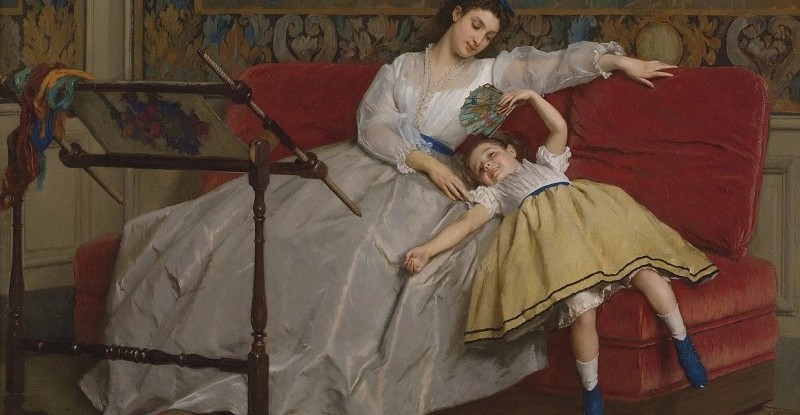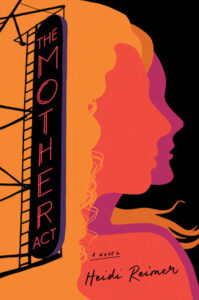
A Daughter Becomes a Mother: On Inhabiting Both Roles in Fiction and in Life
Heidi Reimer: “A mother is also a daughter. A daughter may eventually become a mother. Then, forever, she is both."
I was writing a novel about a woman with a terrible mother when I became a mother myself. In stolen early morning sessions, I read my baggy first draft and made notes on everything that wasn’t working. In endless hours with a baby, a toddler, and never-finished housework, I pondered how to fix it.
The connection to my writing and my creative self was a lifeline in my alien new role as a mother, but the challenges of carving out time and mental energy to write a novel also intensified my overwhelm. My husband was an actor, earning our living out of town for weeks at a stretch.
Whenever I decided the struggle was impossible and I had to put writing on hold, convincing myself to embrace my new identity as a full-time mother and homemaker, I became depressed within days. Some mornings, I lay in bed unable to summon the will to face more of the endless cycle of domesticity.
I now found myself increasingly identifying not with my wounded protagonist but with the bad mother who’d inflicted those wounds.
I’d missed out on the usual nine-month motherhood preparation period, taking on the care of the 15-month-old niece my husband and I would go on to adopt, and doing it the very day we discovered I was (oops) pregnant. I’d been ambivalent about kids, fearing the loss of the solitude and creative space I knew were essential to my wellbeing, worrying motherhood would not be enough to fulfill me and I would fail my children as a result.
My own mother had been all-in. She walked out of her job the day she went into labor with me and never worked outside the home again. She had six kids and she homeschooled us all. More, she’d raised us inside a high-demand religion that mandated one truth and one way of life—and for women, that was a calling to motherhood. She set an example and an expectation I knew I couldn’t follow.
I’d ultimately made the choice to become a mother by writing through my uncertainty, reading the work of others who’d grappled thoughtfully with the decision, and finally accepting the assurance I found there that it was possible to be a good mother and a woman whose sense of purpose came from her creative work.
Now, two daughters in tow, I was trying to be that good mother. Now I was trying to keep that creative work alive. And it was not feeling possible at all.
In the novel I was determined to complete, the terrible mother was a kind of maternal femme fatale: glamorous, elusive, irresistible, and toxic. She’d walked out when the protagonist was a baby, returning just often enough to raise hopes, bequeathing a lifelong struggle with insecurity and unworthiness. She was someone to get over and move on from, not understand or empathize with.
The problem was that I now found myself increasingly identifying not with my wounded protagonist but with the bad mother who’d inflicted those wounds.
She hated the loss of her freedoms. She hated the constant encumbrance. She hated the smallness of her new life, the fact that the necessary but uninspiring tasks of existence, formerly squeezed in around the real goals, now were the real goals. What am I going to accomplish today? Three loads of laundry, yeehaw. She had said, in essence, “I’m withering away here. I won’t sacrifice myself on the altar of motherhood.” She had left.
Check, check, check, and…no. I was most certainly not going to do that. But the mother’s irredeemable transgression, so unthinkable to me when I first conceived my protagonist’s backstory, was becoming increasingly imaginable. It was becoming an active fantasy: what if I walked out?
Except that my imagination could also easily conjure the trauma to my daughters in the wake of such an act. I’d spent years immersed in just that fictional exploration. I’d also spent my entire life as a daughter, not to mention a significant chunk of my adulthood unpacking the psychological effects of my own childhood. In my novel, I’d been keenly interested in a daughter’s journey of self-discovery and self-reclamation because it was my journey. But now I was inhabiting the other side, a woman trying to raise human females while honoring her own needs. And I couldn’t walk out—I couldn’t prioritize myself—because I was not The Daughter anymore.
To find myself no longer primarily a daughter but The Mother—the example-setter, the legacy-bequeather, the inflicter instead of the inflicted-upon—was proving to be one of the more profound of the identity shifts brought on by motherhood.
I began contemplating how I could expand the novel to complicate the mother’s actions, to humanize her a little. The novel was squarely from the daughter’s perspective; the mother had no interiority. Would it be possible, I wondered, to tell part of the story from her point of view?
Inhabiting two opposing perspectives in fiction helped me make sense of the paradox inside my own dual identities.
It wasn’t possible. This was a daughter story, not a mother story.
I was cooking dinner one evening—dirty dishes piled high, unfolded laundry on the table, baby in the wrap on my back and toddler clamoring for attention at my knee—when a new novel flooded in. It came fully formed: an estranged mother and daughter, both of them actors. A dual POV giving equal weight to each of their perspectives. A story set on the opening night of a play. The novel would explore the question I still didn’t have the answer to: was it possible to be a devoted artist and a devoted mother, and what was the cost of each?
A version of that line ended up on the jacket copy for The Mother Act, the novel that would become my debut, and it is plucked straight from the notes I wrote that afternoon in my kitchen. I wouldn’t begin actively writing this new novel for years, but that story percolating in my mind became a creative purpose that enabled me to show up for my daughters with more joy. I had an outlet for the maternal complexity I couldn’t always voice in real life. And inhabiting two opposing perspectives in fiction helped me make sense of the paradox inside my own dual identities.
One hard morning when my husband was away filming, I packed up our daughters and went to my mother’s. I cried about how desperate and trapped I felt. I said, “I am not cut out for stay-at-home motherhood.” In the teachings of my upbringing, this was akin to saying, “I am a godless hussy.” And my mother, the person I thought I had to separate from in order to live my life the way I needed to, said, “Then you shouldn’t be a stay-at-home mother. You don’t have to embrace something that isn’t working.”
A dual POV enables us to experience two sides. Inhabiting a character—as a reader, a writer, an actor—demands deep identification, refusal to judge, an inner grasp on the psychology and motivations of people who may be at complete odds with you. A villain is not the villain in their own story—in their own story, they are the protagonist.
A mother is also a daughter. A daughter may eventually become a mother. Then, forever, she is both.
__________________________________

The Mother Act by Heidi Reimer is available from Dutton, an imprint of Penguin Publishing Group, a division of Penguin Random House, LLC.
Heidi Reimer
Heidi Reimer is a novelist and writing coach. Her writing interrogates the lives of women, usually those bent on breaking free of what they’re given to create what they yearn for. Her front-row seat to the theater world of her debut novel, The Mother Act, began two decades ago when she met and married an actor, and her immersion in motherhood began when she adopted a toddler and discovered she was pregnant on the same day. She has published in Chatelaine, The New Quarterly, Literary Mama, and the anthologies The M Word: Conversations about Motherhood and Body & Soul: Stories for Skeptics and Seekers. Heidi is from Northern Ontario.



















